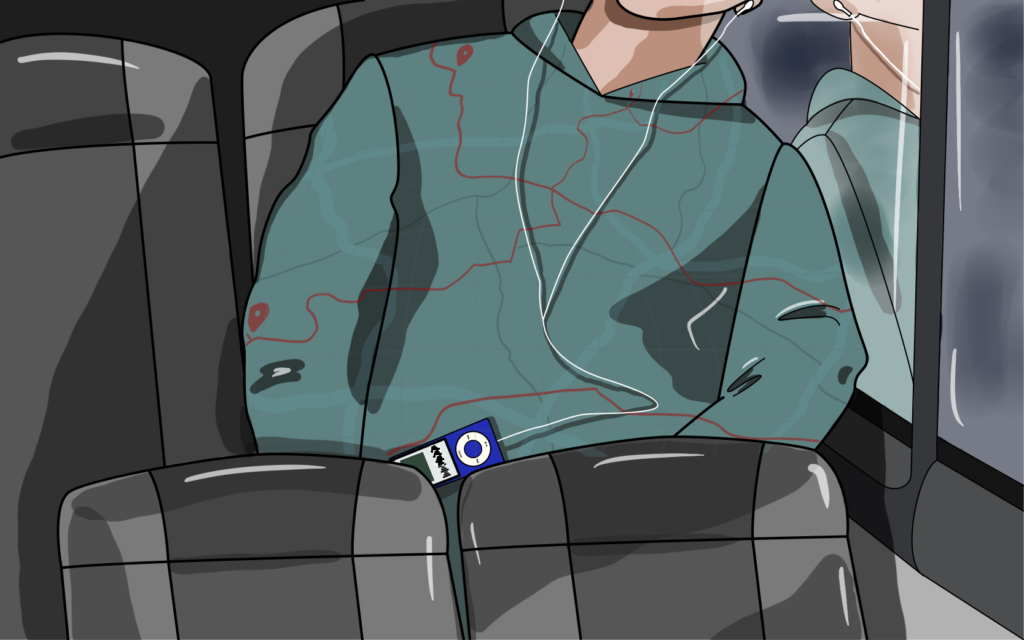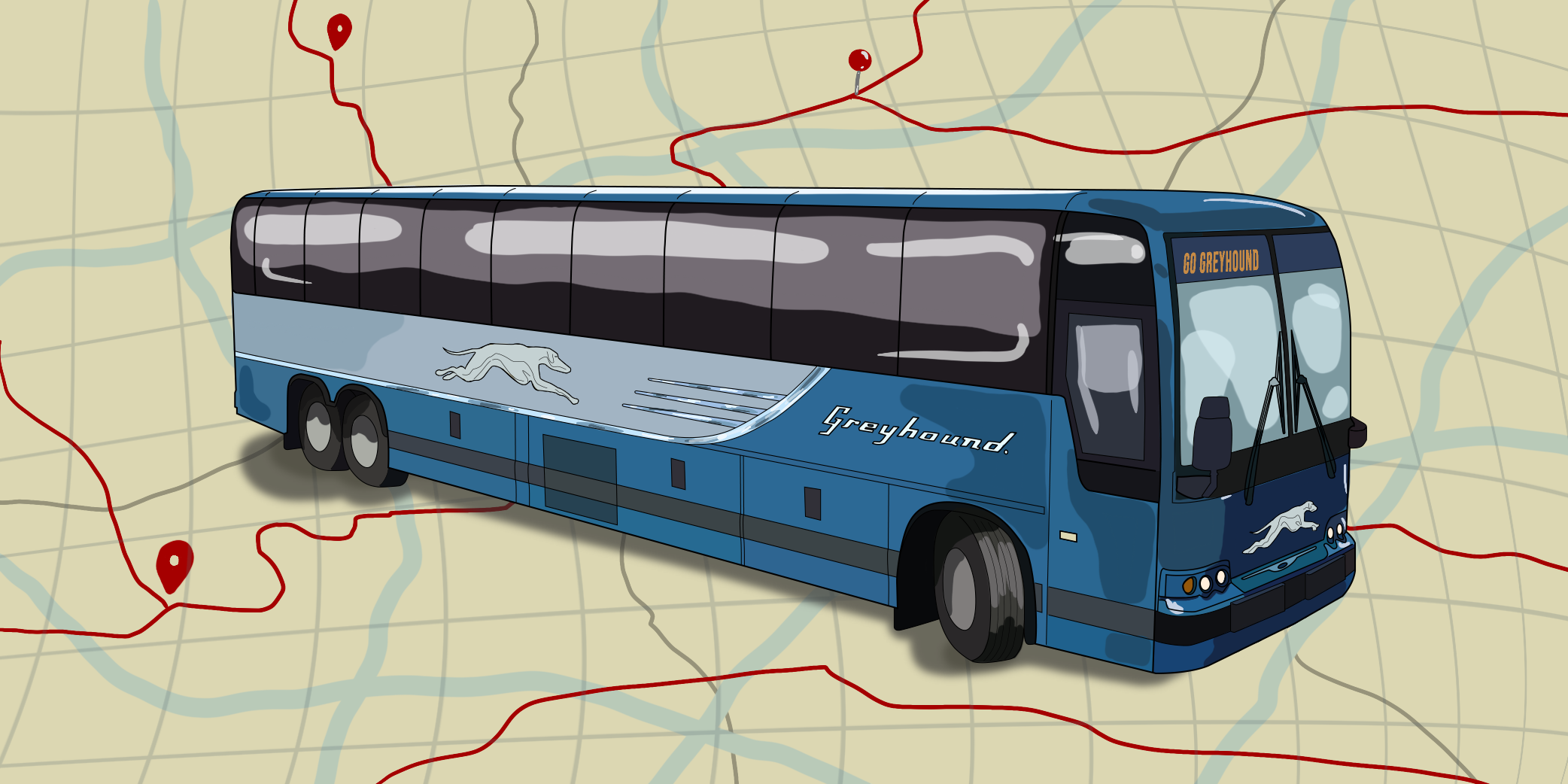No hound could run forever. When the final leg of the blue-and-white bus service across Canada was at long last brought to heel in spring of 2021, the final remnant of that country’s golden age of travel was ushered out.
The Greyhound was escape and pursuit all in one — the old life in the rearview mirror, another brighter one ahead. This was especially true immediately after leaving the bus stations, which were unfailingly peopled with distressed, red-eyed women, and bristly jawed, ruined-looking men. To a person, they looked as though they clutched a switchblade inside their jacket pocket. Their eyes dared you to ask them the time.
The truth is, the glory days of the Greyhound were over long before they folded. The only thing I can ever remember the bus delivering to our little prairie town was my Granny once a year. By the time she arrived in Manitoba from Vancouver, even a seasoned Greyhounder like her looked as haggard and unshaven as the rest of the passengers.
Putting the possible shrink of traveling Grannies aside, the discontinuation has left a bus-sized void in a very Canadian experience. Everyone had a Greyhound story, even those who had never taken the bus. They were as good for geography (“I was riding through Saskatchewan to see my cousin’s new Regina place, but wouldn’t ya know it, we broke down before we even got halfway to Climax. Had to hitch straight over to Fertile”), as they were for life lessons. Regardless how a story began, you knew the good part was coming when they reached the middle, inevitably dramatized with an emphatic “And then, it happened. . .”
It’s these stories, lost now, which informed a generation of travelers across Canada, and brought the nation together in bus station acumen.
It’s been over a decade since my last ride on the Greyhound. I was westbound and 21, traveling from Calgary to Vancouver, a journey of 14 hours. I had just completed the same trip, in reverse, the day before, in an attempt to save a doomed relationship. It had failed, and I trundled back into the bus station after only a few short, draining hours of arguing on the pavement outside.
I fell into a chair beside a man with a large radio on his lap, one hand clutching each rounded end of the speakers. I closed my eyes, and breathed and thought “I’m alone.” When I opened my eyes, the man was holding the radio out at arm’s length, tilting it towards me as though in offering.
“No batteries,” he said, and shrugged.
“I’m alone,” I said, without thinking.
The man shook his head. “Not alone. Freewheelin’,” he said, forgetting, or unaware, that freewheeling just meant unengaged, like the clutch of a bus rumbling down a mountain road at night. No power in the wheels. Just gravity, taking you down, down, until you ran out of gas.
The bus rumbled west after dark. The Rocky Mountains were wicked monoliths, darker than the night sky. The man with the radio was gone, sitting alone somewhere in the shadows of the back seats. I spent the ride with my head against the window, letting it bounce and knock against the glass with the gentle rumble of the bus. I stared at my reflection and listened to country music on my iPod. The songs were the usual bus travel ballads: titles like Depression, Broke Down, Wreck on the Highway, that sort of thing. Dawn broke about the time CCR was halfway through Lodi (“I rode in on the Greyhound, I’ll be walking out if I go”), and we arrived in Hope. The view of town from seat 14A left little to wonder at the name, only whether it was a shortening of a longer name somehow, taken either from the front of . . . the Bus Leaves Soon or the end of Abandon All . . .
And then, it happened.

I was standing at the payphones, wracked with heartbreak and sleep loss, thinking about making another inadvisable phone call, when I noticed a man darting into the station. He was breathless, but smiling and chipper, with the friendly-but-threatening look particular to rural folk. Upon making eye contact, I lifted the payphone to my ear, but it was no use. He made for me, and as he neared, I attempted and failed to replicate that same open menace on my own face.
“Buddy,” he said. There was a tang of cheap beer and chewing tobacco on his voice. “I need your help, eh?” It wasn’t a question. “I’ve got to pay this guy, real quick. I just need 20 bucks. I wouldn’t normally ask, y’know, but I’ve just got to pay him, like, right now. I’ll pay you back once my wife arrives.”
I nodded the way you do when you’re a foreigner and understand someone has finished a sentence. “I don’t know,” I said. “The bus. . . I think it’s leaving soon.”
“Don’t worry,” he said. “My wife’s on her way!” He made a furtive glance over his right shoulder, then his left. “I won’t be a minute!”
At that time, I generally didn’t have enough to feed and clothe myself, let alone strangers. But something told me the man had less than I did, even if I had nothing in particular, except an iPod full of sad country songs. Anyway, I was feeling flush, having just withdrawn my last $60 in Calgary. I cradled the payphone, dug out my wallet, and handed over the money.
Cash in hand, he spun around and bolted out a door marked emergency only. I stood for a moment, feeling dazed and fragile, a proverbial deer in the headlights. A second later he was back, bursting into the station using the same door. “Hey buddy, sorry, it’s actually 40 bucks.”
“40 more, or 40 total?”
He thought for a moment, then said “40 more.”
Freewheeling. No clutch, no power. I handed over the money and stood stiffly as he slipped out the door.
I stood for a few more minutes, wooden and hungry. A moment passed, or perhaps an hour. Then the bus rattled alive and the traveling horde staggered to life, stubbing cigarettes and shouldering bags as people reboarded. My desire to leave was greater, and I abandoned him, my money, and Hope in one fell swoop.
Today, I like to think the man still haunts the defunct bus station. Maybe his wife never arrived. Maybe he’s hanging around, asking after someone who looks like me, my 60 bucks burning a hole straight through his pocket. In my mind’s eye, he approaches a lonely stranger rallying themselves in the corner. He tells them his story — they have time, there’s no bus to catch now, after all. They listen, eager to get away, but he leans in, the cheap beer still staining his breath. He wants to explain. “My wife, she was coming with the money, eh?’ he says. ‘I needed to pay the guy, I really needed to, so I came in here. . . and then it happened.” •




